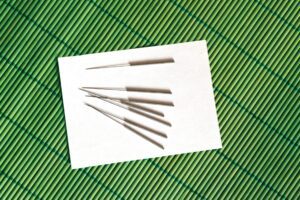5 Reasons TCM Acupuncture May Be For You
Although acupuncture is thousands of years old, its popularity continues to rise as more and more people seek out treatments that are safe, medicine-free, effective and carry few side effects. The practice of acupuncture has its origins in Traditional Asian Medicine or Traditional Chinese Medicine (TCM), and Naturopathic Doctors are also trained to use Acupuncture and Eastern herbs to bring balance to the body.
What is TCM, and how can it benefit you?
Traditional Chinese Medicine (TCM) views the organ systems of the human body as a collective, with the health of every part of the body being interrelated. Treatments are based on the theory that there is a vital force (Qi) that drives the body and is considered absolutely essential for our health and wellbeing.
Qi consists of two opposing yet mutually supportive elements – yin and yang. We experience a state of health when they are in balance, and disease develops when they are imbalanced because of stress, poor sleep, destructive lifestyle choices or invasion by external pathogens. Do these imbalances sound familiar?
Contact me to see if Acupuncture is right for you
The Benefits of Acupuncture
Acupuncture exists to balance the flow of Qi (pronounced “chee”) through the body. Although it is an ancient technique, it has continued to evolve over the years into its contemporary form.
Acupuncture treatments involve the insertion of fine needles into specific points (acupuncture points) on the body. According to TCM theory, when the needles are inserted into these specific acupuncture points, Qi is stimulated and can be focused on different organ systems to correct any imbalance.
When Qi flows freely through the body’s systems the body’s natural healing mechanisms are activated, allowing the body to heal from the ailment. Acupuncture is often described as a very relaxing, enjoyable, and painless treatment. My technique is catered towards a patient-friendly experience.
Is Acupuncture Safe?
Acupuncture is very safe in general practice, as well as for cancer patients. Serious problems arising from acupuncture are rare, and generally avoided by well-trained acupuncturists. It is always a good idea to inquire about the training of any acupuncturist you are considering working with. Did you know that I am Board Certified to practice Naturopathic Medicine AND Acupuncture in Ontario?
Does acupuncture hurt?
Acupuncture is usually comfortable and relaxing, in fact many people fall asleep during the treatment. Acupuncture needles are extremely thin, even thinner than a human hair, and cause little to no sensation on insertion. We use the very thinnest needles available on every patient.
The Scientific Basis of Acupuncture
In modern science, the mechanisms behind how TCM and acupuncture work are still poorly understood, although the results are acknowledged. One theory states that the meridians (the pathways that run through the human body along which acupuncture points are found) correspond with the distribution of nerves in the body. Since the nervous system controls all other systems of the human body (including endocrine, digestive, immune, reproductive, respiratory and cardiovascular systems), it is understood that the stimulation of the nervous system can impact overall health. Other theories suggest that acupuncture affects the endocrine system, or the fascia of the body as seen in physical-based forms of acupuncture such as “trigger point needling” or “dry needling”, which are usually used for pain or mobility issues.
The Top 5 Reasons Naturopaths & TCM Practitioners use Acupuncture
Acupuncture can bolster the body and brain in a number of ways, improving energy levels and promoting blood flow, nerve function, digestion and healing. The goal of treatment is to uncover and address the underlying imbalance that is at the root of the troublesome symptoms. These are the top 5 reasons patients tend to seek out acupuncture:
1.Chronic Pain Relief
One of the most popular and well-known uses of acupuncture is pain relief, specifically chronic pain such as back problems, headaches/migraines, muscle spasms, osteoarthritis, and joint pain.
A 2017 meta-analysis of 39 studies and over 20,000 patients was conducted to ascertain whether there was a placebo effect at play, comparing the results of sham acupuncture to real acupuncture. The results confirmed that the effects of acupuncture on chronic pain are clinically significant and appear to persist over at least a 12 month period.
2. Autoimmune Conditions
Autoimmune conditions arise when the body’s immune system starts to attack the body’s own cells. This can happen for a variety of reasons, and finding a successful treatment for each unique case can be frustrating. Clinical research has shown that acupuncture can help to support immune function and potentially alleviate autoimmune symptoms by causing physical responses in the brain.
A study conducted in 2015 by the Department of Surgical Sciences at the University of Turin found that stimulating acupressure points significantly improved the symptoms of patients with a multi-system autoimmune disease, Sjögren’s syndrome. The benefits were found to last for months following treatment.
3. Integrative Cancer Care
Acupuncture provides the option of a simple, safe, drug-free supportive therapy for cancer patients that can bring significant relief at a relatively low cost. Many patients report a greater sense of calm and well-being. Acupuncture is now commonly offered at many leading cancer hospitals in the USA and around the world including the Cleveland Clinic, Mayo Clinic, Dana Farber Cancer Center, Memorial Sloan-Kettering Cancer Center, MD Anderson Cancer Centre, the Cancer Treatment Centers of America, numerous cancer centers across Europe, and at many top-tier biomedical hospitals across East and Southeast Asia.
While it’s challenging to evaluate acupuncture using conventional research, numerous studies suggest acupuncture can help reduce chemotherapy-induced nausea and vomiting, cancer-related fatigue, leucopenia, pain, neuropathy, xerostomia (dry mouth), dysphagia (swallowing difficulties), shortness of breath, hot flashes, lymphedema, anxiety, insomnia, and digestive problems.
A 2015 review showed therapeutic effects from acupuncture in the management of cancer-related fatigue, chemotherapy-induced nausea and vomiting and leukopenia in cancer patients. Another systematic review found evidence that acupuncture was effective for hot flashes, fatigue, pain and nausea/vomiting in breast cancer patients.
“Regardless of the specific molecular basis of the effects, acupuncture for nausea/vomiting is a safe and inexpensive treatment that can relieve considerable suffering and may be an especially important option for patients who do not get good symptom control with pharmaceuticals.” Journal of Clinical Oncology
4. Infertility
Acupuncture has become one of the more popular integrative treatments used to support couples experiencing infertility. Through bringing balance to the body as a whole, and the endocrine system in particular, acupuncture may nudge a woman’s cycle into balance making it more predictable. It can also improve blood circulation, over time improving ovary function and the quality of sperm and eggs.
In 2002, German researchers found that adding acupuncture to conventional IVF treatment protocols substantially increased pregnancy success.
5. Sleep
Insomnia is an increasingly common condition in modern society, however most conventional sleep medications carry a risk of becoming less effective over time as well as having unwanted side effects. In China, acupuncture is regularly used to treat insomnia without any side effects. Although there are many possible causes of insomnia, the acupuncturist’s role is to assess where the issue stems from and treat the underlying imbalance to achieve longer lasting results.
There have been a number of studies comparing acupuncture and medication for insomnia. In a 2013 study, researchers found that not only did acupuncture improve sleep quality more effectively than medication, it also improved daytime functioning.
Acupuncture can be an extremely useful tool to bring balance back to your body and help you to feel better immediately and in the long term, without any fear of side effects or negative interaction with medications.
Resources
Acupuncture and Chronic Pain: https://www.ncbi.nlm.nih.gov/pmc/articles/PMC5927830/
Acupuncture and Stress: https://www.ncbi.nlm.nih.gov/pmc/articles/PMC6625224/
Acupuncture and Autoimmunity https://pubmed.ncbi.nlm.nih.gov/24820476/
Acupuncture and Cancer https://www.nature.com/articles/srep16776 , https://www.ncbi.nlm.nih.gov/pmc/articles/PMC3925001/
Acupuncture and Fertility https://pubmed.ncbi.nlm.nih.gov/11937123/
Acupuncture and sleep https://www.ncbi.nlm.nih.gov/pmc/articles/PMC3789397/



